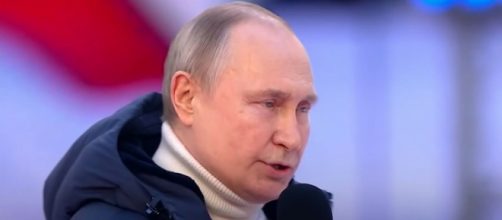Russian President Vladimir Putin justified his invasion of Ukraine and praised the bravery of Russian soldiers in a speech at Moscow's Luzhniki Stadium on March 18. The Guardian quoted Putin as saying Russians had launched the invasion in order to end a genocide in the Donbas area of eastern Ukraine. "Stopping that was the goal of the special operation," said Putin, according to the paper.
The 69-year-old leader was quoted by Al Jazeera as saying Russian soldiers were supporting each other "and when needed they shield each other from bullets with their bodies like brothers." The event in the 80,000-capacity stadium had been organized to celebrate the eighth anniversary of Russia's annexation of Crimea, Al Jazeera said.
Police had estimated the size of the crowds in and around the stadium at 200,000, the news outlet said. CNN reported that some state employees had been ordered to attend the event.
Malfunction interrupts broadcast
France 24 noted that Russian state television's broadcast of the five-minute speech had been interrupted by a technical malfunction, but the broadcaster had then shown the speech in its entirety. The Telegraph said that Putin had appeared to walk with a limp.
Russian hypersonic missiles strike munitions depot
Hours after Putin's speech, AFP reported that the Russian Defense Ministry had claimed to have used hypersonic missiles to destroy a Ukrainian munitions depot. This was believed to be the first time the Kinzhal hypersonic missiles had been used against Ukraine, AFP said.
The New York Times said the attack on the depot in the western Ukrainian village of Delyatin could not be independently confirmed. The paper noted that some military authorities had doubted Russia's ability to use hypersonic missiles in combat.
Al Jazeera recalled Putin's claims that Kinzhal missiles could travel at 10 times the speed of sound and penetrate any American air defense system. Al Jazeera recalled that the development of the Kinzhal had first been announced in 2018.
One in five Ukrainians have abandoned their homes
On March 19, The New York Times cited estimates from the United Nations that 20 percent of the 44 million people living in Ukraine before the war had been forced to leave their homes.
The paper said that on March 18 the first United Nations convoy of food, water and medicine had arrived at the eastern Ukrainian city of Sumy.
According to the organization's estimates, more than 12 million Ukrainians were trapped in areas surrounded by safety hazards, the paper said.
The Hill recalled that Russia had started the war in Ukraine on February 24, but the Ukrainians had so far refused to be subdued.


